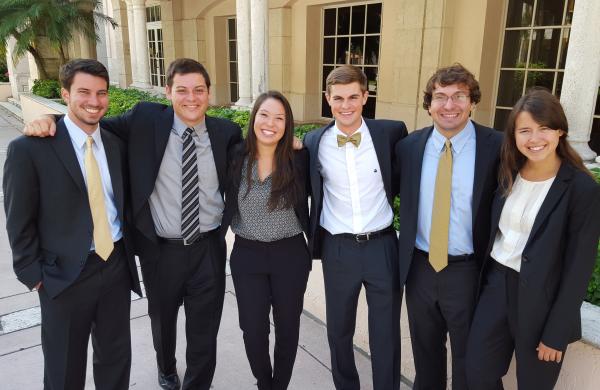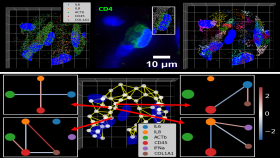Six Georgia Tech biomedical engineering (BME) students won the best design category among teams developing solutions for an improved epidural delivery system. They were competing in the Biomedical Engineering Society’s (BMES) Coulter College event held August 13-16, 2015 in Coral Gables, Florida. More than 60 teams apply for the competition, but only a third of them are invited to participate. BME’s winning team consisted of Emma Mihevc, Cory Turbyfield, Joshua Bugica, Alex Hubbard, Emma Poe-Yamagata, and Will McAllister. They were competing against Johns Hopkins, Boston University, Florida State, and other notable programs. They participated in the both the design and best pitch competitions.
“The Georgia Tech BME team did an amazing job of representing our department and our university,” said James Rains, BME’s director of capstone design in the Wallace H. Coulter Department of Biomedical Engineering at Georgia Tech and Emory. “I received many compliments regarding their performance throughout the event, but was blown away with their great team work, ingenuity, and polished presentation skills.”
Coulter College is a training program focused on translation of biomedical innovations. Student design teams are guided by faculty and clinical experts through a highly dynamic process designed to help them better understand how innovations can meet clinical needs while providing tools and approaches used to evolve identified problems into novel solutions. The program is supported by the Wallace H. Coulter Foundation.
In the competition, student teams are given a list of unmet clinical needs, they research and rank their top choices. Shortly afterwards, they are notified of the unmet clinical need they will address and given an assignment to prepare. In this case, they were asked to work on an epidural system.
“The design process is one of my favorite things about being an engineering student,” said BME student Alex Hubbard. “The Coulter College made designing even more fun by providing each team with a box of materials like modeling clay, Tinker Toys, pipe cleaners, and trig cards with interesting prompts to encourage creativity while brainstorming. We followed a ‘no-negativity’ rule such that whenever someone had an idea that seemed far-fetched, we weren't allowed to say anything negative about it, so we went off on several crazy tangents. One of these tangents was inspired by reading cards that encouraged us to relocate the epidural process or alter the process such that a physician wouldn't need to come near the patient, both of which seem ridiculous at first glance. However, a few crazy tangents later, we came upon the idea of encasing the medications delivered during a normal epidural injection in a hydrogel or other polymer, injecting that solution into the patient's epidural space weeks before the due date, and activating it via ultrasound upon when the patient arrives at the hospital to give birth.”
Cory Turbyfield added, ”for me, the coolest part of the competition was all of the people there: BME students, professors, clinicians, CEOs, designers, professionals, and more. Everyone brought with them their own set of experiences, and we had the opportunity to learn from each and everyone one of them.”
The team’s idea and subsequent presentation earned the team the best design award at the competition.
“They worked their butts off staying up to 3:00 a.m. each night and being there bright and early at 7:00 a.m. to start it all over again— for four consecutive days. I am not sure how they were able to even start classes on Monday,” said Rains.
Contact:
Walter Rich
Communications Manager
Wallace H. Coulter Department of Biomedical Engineering
Georgia Institute of Technology
Media Contact
Media Contacts:
Walter Rich
Communications Manager
Wallace H. Coulter Department of Biomedical Engineering
Georgia Institute of Technology
Keywords
Latest BME News
Courses in the Wallace H. Coulter Department of Biomedical Engineering are being reformatted to incorporate AI and machine learning so students are prepared for a data-driven biotech sector.
Influenced by her mother's journey in engineering, Sriya Surapaneni hopes to inspire other young women in the field.
Coulter BME Professor Earns Tenure, Eyes Future of Innovation in Health and Medicine
The grant will fund the development of cutting-edge technology that could detect colorectal cancer through a simple breath test
The surgical support device landed Coulter BME its 4th consecutive win for the College of Engineering competition.
New research from Georgia Tech helps doctors predict how therapies will interact with a child's immune system, potentially improving outcomes and reducing risks.
Georgia Tech researchers reveal the dynamic role of inhibitory neurons in spatial memory and learning








